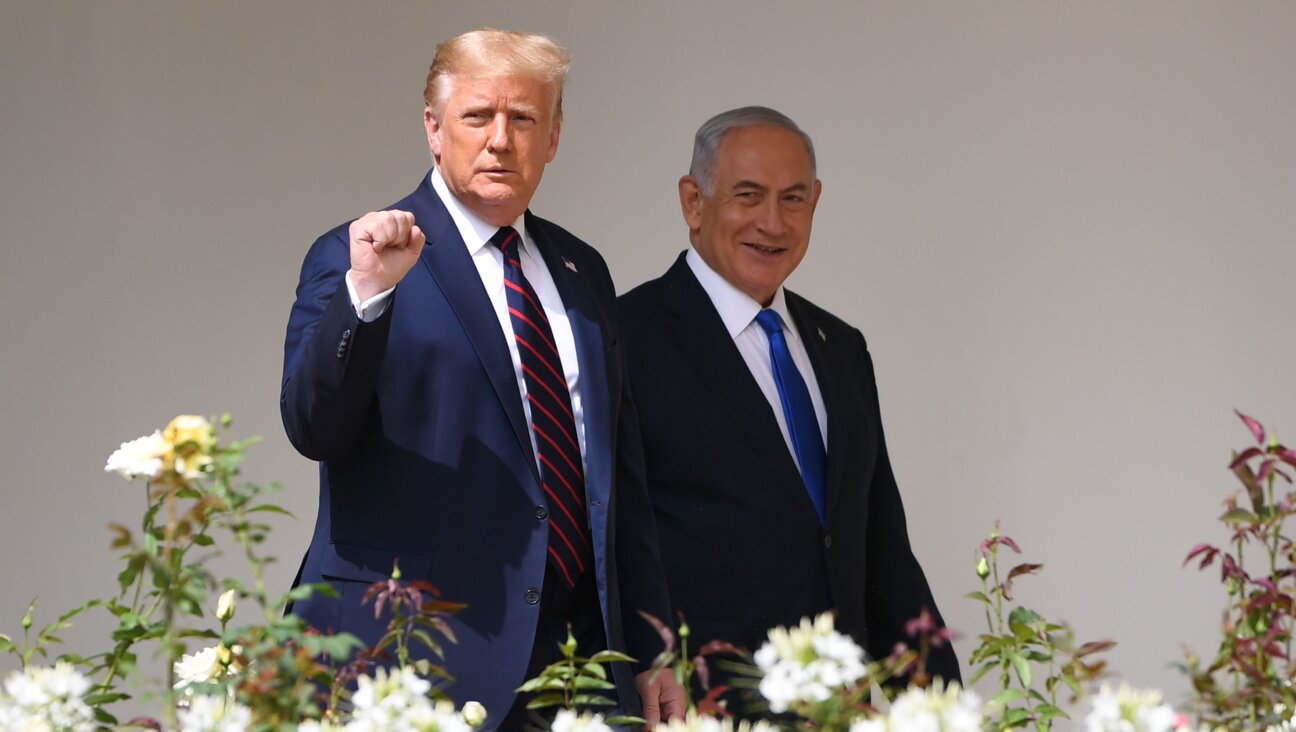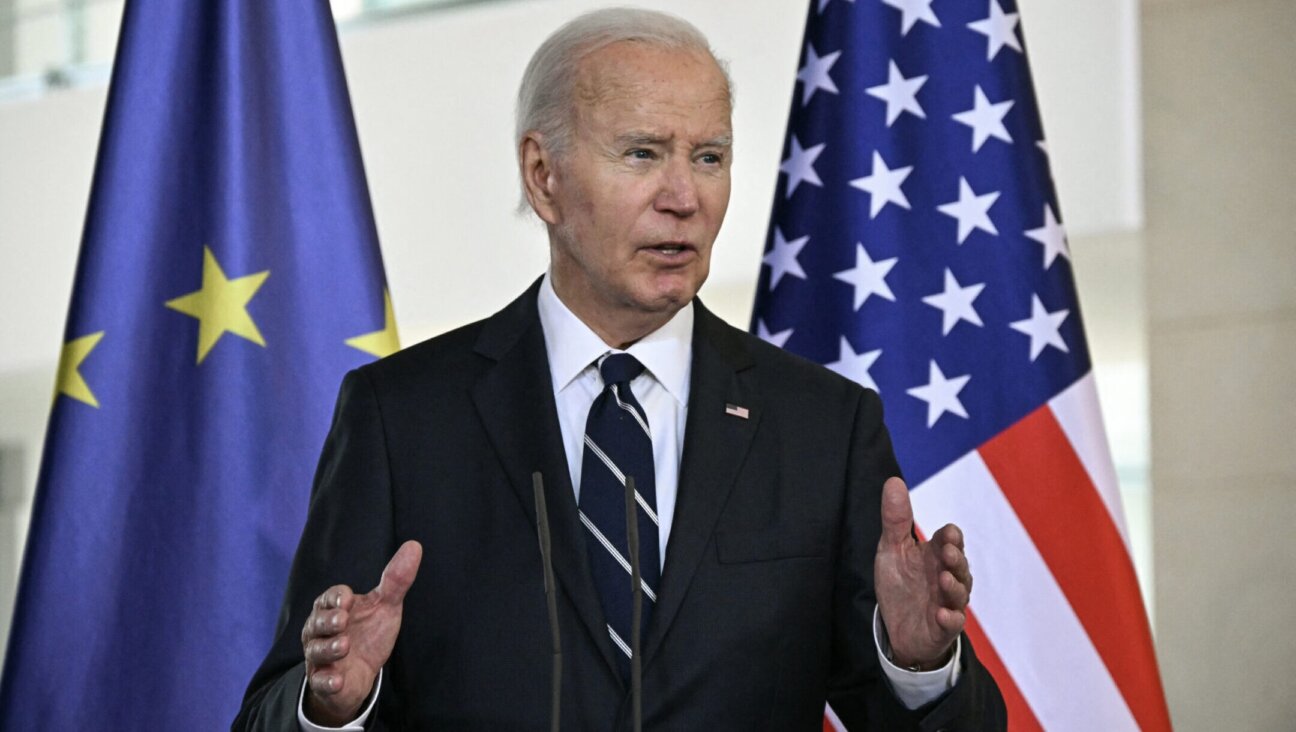Michael Chabon Touched A Nerve — And Shouting Him Down Is Not The Remedy

Israeli-American novelist Ayelet Waldman (R) and her spouse American novelist Michael Chabon pose for a picture in Jerusalem on June 18, 2017. Image by Getty Images
Michael Chabon’s recent graduation speech to the Hebrew Union College-Jewish Institute of Religion (HUC-JIR) has reinvigorated fiery accusations of Israel- and Jewish self-hatred against Jewish opponents of Israeli administration of the West Bank. Not only Chabon, who vigorously voiced this opposition, but also HUC-JIR, which hosted him, have come under attack.
These ugly charges impoverish the very Zionist argument they seek to support, because they narrow the range of healthy debate that has always characterized the Zionist enterprise. Worse, they betray a fear of reasoned disagreement. The Zionism of these reductive, hair-trigger accusations suggests a delicate ideology that cannot sustain the competition of ideas. But the Zionism of Israelis and committed American Jews is no such snowflake; it is a robust and vibrant proposition, fully able to absorb, respond, and adapt to reasoned critique.
The controversy around Israel’s role in the West Bank provokes particularly strident discord within the Jewish community and in its outward-facing politics-hence the name-calling. Precisely because the stakes are so high, both Left and Right should resist the specious charges of Israel — or Jewish self-hatred against their opponents. These allegations forsake the spirit of committed debate among a single people, and in practical terms, they thwart a clear-eyed assessment of a legitimately difficult reality.
As a matter of principle, the charge of Israel-hatred dulls our Jewish and American traditions’ self-assured embrace of a free marketplace of ideas. Under the sway of such accusations, we shut down the Rabbinic dictum legitimating both sides of a dispute as “words of the living God.” And we ignore James Madison’s preference expressed in The Federalist Papers for “the increased variety of parties comprised within the Union” as a source of political security for all.
To be sure, the early Rabbis limited their penchant for debate with a proviso. Though “every disagreement with a heavenly purpose endures” in its pursuit of truth, “one that lacks a heavenly purpose does not.” The learned debate of Hillel and Shammai represents “disagreement with a heavenly purpose,” while Korach’s attempted coup against Moses represents one that lacks such purpose.
The epithets “Israel-hater” and “enemy of the Jews” attempt to relegate Jewish opponents of Israel’s administration of the West Bank to the camp of Korach. They lump loyal critics of Israel with renegades, traitors to the shared Zionist project and, therefore, ineligible to disagree with leadership. But such dismissal conveniently avoids grappling with the fact that left-wingers, or doves, aim for nothing less than Israel’s success as a secure, Jewish, and democratic state.
Like the Right, the Left argues from a security perspective. They see the West Bank not as a bulwark against violence but as a threat to Israel’s security, demography, and character. Where the Right considers it utterly naïve to disengage from the West Bank, the Left sees a Zionist imperative.
Moreover, liberal American Jews did not invent disengagement; that honor belongs to Ariel Sharon. His successor, Ehud Olmert, viewed it as inevitable, even though he fully appreciated that it would “.obligate us to rip away many portions of the homeland – in Judea, Samaria, Jerusalem and the Golan Heights.” Former Israeli prime ministers, from both the Left and the Right, pragmatically concluded that parts of the land are not worth the cost of retaining them.
Sometimes nomenclature muddies our understanding of those areas in relation to Israel. “West Bank,” “Cisjordan,” “Judea and Samaria,” and “Occupied Territories” all reflect authentic facets of reality. If someone wants to argue the West Bank’s identity with Israel, well and good. Likewise, if one recognizes occupation as such, but concludes its necessity for Israel’s security. Those positions fall well within the pale of reasonable debate. They do not, however, justify besmirching those who distinguish between Israel and the West Bank, and who view Israel’s administration of the West Bank as occupation. That position, too, falls within the pale.
Offended by Michael Chabon’s words? Have at it. Chabon’s words and tone encourage it, and as an institution of higher learning, so does HUC-JIR. The lack of a unified Jewish front regarding Israel’s West Bank policy need not represent a gross fissure in our fundamental and abiding commitment to the State of Israel. But personal attacks on Jewish Zionists as Israel-haters might open one up. In addition, these charges misuse, and thereby undercut the power of, terms like “antisemite,” making it easier for real enemies of the Jews to shrug them off.
In closing: a concession and a call to reason. In a perfect world, liberals or doves would not need to preface every reasoned criticism with a disclaimer professing love and commitment to Israel as a secure, Jewish, and democratic state. Absent a perfect world, however, the Left would benefit from shoring up its rhetoric with more of those statements, if nothing else because they’re true and some people need to hear them.
It is also true that enemies of Israel may take cover behind Jewish criticism of Israel, and that fact deserves our attention. It does not deserve our fearful self-recusal from the substantive debate. Nor does it does justify collapsing proper critique and downright hostility into a single undifferentiated phenomenon, especially when the critique comes from proud Jews who care about Israel. So, hawks and conservatives, for their part, need to rein in their own partisans who cheapen this important debate with shrill, inaccurate, and destructive accusations. To be sure, our individual views of “the truth” may jostle and chafe one another. But each position belongs to a whole that is a vital part of a single Jewish people with a shared destiny. It’s time we recognize this and act accordingly.
A message from our Publisher & CEO Rachel Fishman Feddersen

I hope you appreciated this article. Before you go, I’d like to ask you to please support the Forward’s award-winning, nonprofit journalism so that we can be prepared for whatever news 2025 brings.
At a time when other newsrooms are closing or cutting back, the Forward has removed its paywall and invested additional resources to report on the ground from Israel and around the U.S. on the impact of the war, rising antisemitism and polarized discourse.
Readers like you make it all possible. Support our work by becoming a Forward Member and connect with our journalism and your community.
— Rachel Fishman Feddersen, Publisher and CEO
























